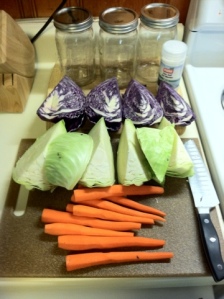Article originally posted at The Survival Sherpa
There are 10 times more bacteria in your gut than total cells in your body. All those microscopic critters can either help or hurt.
For thousands of years humans have used this ancient method to extend the usefulness of food. The Greeks called it ’alchemy.’ Not the kind where you’d attempt to change base metals into gold. No. They discovered that the chemical change that took place in fermentation was very beneficial in preserving food. This was before we even knew bacteria existed.
Down and Dirty Sauerkraut in the making
Now we know there’s more to this fermentation stuff than just making food last longer. The fermentation process boosts nutritional value, vitamin level, and the seer number of beneficial bacteria as it transforms cabbage into Down and Dirty Sauerkraut, raw dairy into yogurt, and cacao into dark chocolate. Even for us non-grain eating Primal/Paleo types, an occasionalslice or two of sourdough bread made from fermented wheat is a better choice if you just gotta have a slice of bread sometime.
Fermentation takes food that is indigestible and turns it into a vitamin rich, microscopic, gut flora building power house.
Listen to Your Second Brain
I often advise people to ‘follow your gut‘ when struggling over a big decision. It seems there’s more to this gut-brain axis than we think.
According to Dr. Mercola,
Your gut literally serves as your second brain, and even produces more of the neurotransmitter serotonin—known to have a beneficial influence on your mood—than your brain does.
Your gut is also home to countless bacteria, both good and bad. These bacteria outnumber the cells in your body by at least 10 to one, and maintaining the ideal balance of good and bad bacteria forms the foundation for good health—physical, mental and emotional. [Emphasis mine]
More importantly, the good bacteria in fermented foods promote self-healing. Science has proven what people have been practicing for thousands of years: Delicious, bacteria laden foods promote optimal health.
You may be eating fermented food without realizing it. Here’s a few ‘rotten’ items that you probably enjoy:
- Cheese
- Coffee
- Tea
- Pickles
- Vinegar
- Yogurt
- Kombucha
- Kefir
- Kimchi
- Beer and wine
- Seal flippers – One of you favorites, right? Add this one if you’re bugging out to the Arctic.
- And one of my favorites – sauerkraut
Feed Your Second Brain
All of the yummy goodness listed above (with the exception of seal flippers) are Second Brain Food. You don’t have to eat fermented foods all day long. Just a serving (1/4 to 1/2 cup) adds millions of friendly bacteria to your system. The health benefits are plentiful.
- Decreased chance of colon cancer
- Dental health
- Detoxifier – grab and eliminate toxins and heavy metals
- Boosts your immune system by balancing the trillions of friendly bacteria with the bad bacteria in your intestinal tract
- Reduces inflammation
- Helps in digestion
- Aids in weight loss by stabilizing blood sugar
- Traditional fermented foods helps reduce our modern diet deficit of good bacteria
- Introduces variety in textures and tastes to our ‘civilized’ guts
If you don’t like sauerkraut, it may be because you’ve only tried store bought imitations that taste bland and colorless. My homemade Down and Dirty Sauerkraut is full of flavor and kick. It’s alive and full of probiotics!
Next, I’m going try my hand at DiY kombucha. My good friend, Crunchy Mama, is sending me some scoby to get started. I’ll post a follow up on our latest fermented adventure.
Until then, I highly encourage you to store and add fermented foods
to your pantry. Some of these foods have very long shelf-lives. Learn to make your own with things like yogurt, kombucha, and kefir.
These resources will help get you started on your path to a healthy gut flora. What’s your best methods for adding beneficial bacteria to your gut and pantry?
Doing the stuff,
Todd
Todd Walker is married to the lovely Dirt Road Girl, proud father and grandfather, a government school teacher, a lover of the primal/paleo lifestyle and liberty. His website, Survival Sherpa, provides information about ‘doing the stuff’ for self-sufficiency, preparedness, natural health, and functional fitness. Connect with him on Twitter, Facebook, and Pinterest. Send him mail: [email protected]

